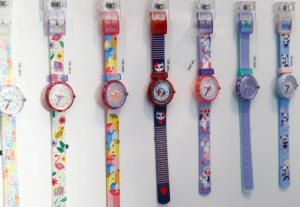Investors feel the pinch of thriftier consumers on company profits
 Send a link to a friend
Send a link to a friend
 [August 08, 2024] By
Danilo Masoni [August 08, 2024] By
Danilo Masoni
MILAN (Reuters) - Investors in large consumer-goods companies are having
to up their stock-picking game, as a post-pandemic spending splurge
dries up and increasingly price-sensitive shoppers start to erode
corporate pricing power.
Profit warnings in sectors ranging from luxury to food and airlines have
fed into worries about a slowdown in the United States and other major
economies.
These growth concerns were one of the factors behind a selloff that
stripped around $4.8 trillion off global equities in just three days
this month.
Stock pickers now need to identify those businesses that won't suffer
from a normalization of spending patterns, let alone from an economic
recession.
"Consumers have been able to absorb price increases thanks also to the
exceptionally high level of savings accumulated (during the pandemic).
It seems that now this is coming to an end," Chiara Robba, head of LDI
equity at Generali Asset Management in Paris, said.
"The second-quarter reporting season is showing some signs of consumer
slowdown with consequent attempt from companies to reduce prices to
boost consumption," she said.
S&P Global's business activity surveys in July suggested firms in the
United States and the euro zone weren't able to pass on higher costs
quite as easily as before.
There's now a long list of company earnings that point to a softening of
pricing power or weakness in consumer spending.

Notable examples include Nestle and Ryanair in Europe and McDonald's in
the U.S., along with payment firms such as Visa and Worldline. In many
cases, share prices have tumbled.
Forty companies have cut guidance so far this season in Europe, BofA
said on Tuesday, the most in over a year, with a majority citing weak
demand, including, surprisingly, in the U.S..
"Signs of consumer weakness have caused concern," it said.
SOBERING-UP LUXURY SPENDING
The high-margin luxury industry hasn't escaped and while companies point
to the long downturn in China, investors are also paying close attention
to spending patterns elsewhere.
Kering's Saint Laurent cut prices of its Loulou bag in France, the UK,
U.S. and China by 10-15% in May in a "very rare" move for the sector
which Barclays said could reflect the brand acknowledging its earlier
price hikes had been too aggressive.
Following three years of above-average increases, luxury price inflation
is showing signs of returning to its long-term range of 5-7%, or below,
said Luca Solca, an analyst at Bernstein in London.
"Weak brands that had been jumping on the bandwagon and increased prices
materially are forced now to correct through discounts and promotions,"
he said. "This is happening because middle-class consumers in the West
are sobering up from the post-pandemic euphoria."

[to top of second column] |

Flik Flak children watches are seen at the shop of Swiss watch
manufacturer Swatch in Zurich, Switzerland April 14, 2021. REUTERS/Arnd
Wiegmann/File Photo

Burberry, which sacked its CEO and warned on profit in July, has
been cited as one example. Its shares erased almost one fifth of
their value on earnings day.
Swatch and Hugo Boss have become the two most shorted stocks on the
pan-Europe STOXX 600 index following disappointing numbers, data
from Mediobanca shows.
Even sector leader LVMH, Europe's second-largest listed company
behind Danish drugmaker Novo Nordisk, isn't immune.
"There is certainly a sense of consumer resistance to higher prices,
given the ongoing cost of living crisis," Sanjiv Tumkur, head of
equities at Rathbones Investment Management, said.
"This appears to be felt across all income segments – for example
the luxury goods companies are seeing more challenging and volatile
consumer conditions in many geographies, notably China, in all but
the top end of the market."
CONSUMER POLARIZATION
Gillian Diesen, senior client portfolio manager at Pictet Asset
Management, believes the latest earnings releases point more to
consumer polarization than a generalized loss of pricing power.
"At the highest end, most premium brands... are raising pricing
again this year, although at more normalized levels," she said,
adding that the trend extended beyond the luxury sector.
Carmaker Ferrari beat expectations thanks to sales of its pricier
models, even though consumer demand in the auto sector has been
variable.
Differentiation is a big factor too - sectors with low levels of
differentiation, such as personal care and food and beverages, could
be most at risk, said Generali's Robba.
In sporting goods, Diesen said higher-end innovative brands like On
and Deckers' Hoka continue to benefit from pricing and sales growth,
in contrast to mainstream names like Nike and Puma, which cut its
profit outlook on Wednesday, sinking its shares to a six-year low.

In airlines, Rathbones' Tumkur cautioned against extrapolating
Ryanair's warning to the rest of the industry, citing better demand
at rivals Easyjet and Jet2.
"Ryanair is also more of a pure low-cost carrier, whereas its rivals
have more exposure to package holidays, which seems to be currently
prioritized more highly by customers," he said. "As ever stock
selection will be key."
(Additional reporting by Jonathan Cable in London; Editing by Amanda
Cooper and Kirsten Donovan)
[© 2024 Thomson Reuters. All rights
reserved.]
This material may not be published,
broadcast, rewritten or redistributed.
Thompson Reuters is solely responsible for this content. |